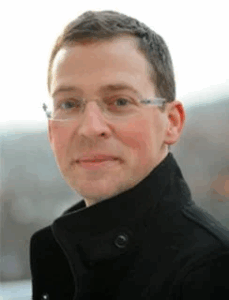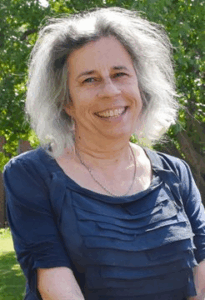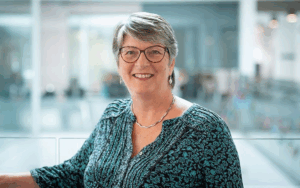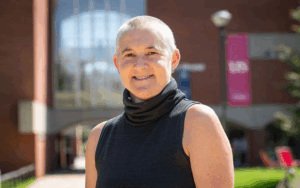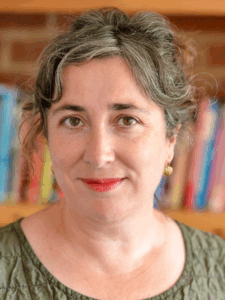Catherine Will was Professor of Science and Technology Studies at the University of Sussex. Catherine died on 12th August 2024 at age 47 after a long period of illness. Catherine was diagnosed with a form of brain cancer in 2021 but continued to work until just before her death.
Catherine’s work and teaching, friendship and intellect, touched and helped many people, not least in the STS community. Catherine’s friends and colleagues organised this memorial symposium to commemorate her life and work. The symposium was held at the University of Sussex on 14th April 2025, and was generously supported by the Foundation for the Sociology of Health and Illness, MedSoc (BSA), the University of Sussex and the Attenborough Centre for Creative Arts.
The symposium was introduced by Sasha Roseneil, Vice Chancellor of the University of Sussex, and Jo Moran-Ellis, Head of Sussex’s School of Law, Politics and Sociology. There were four panels through the day. The first featured personal reflections from Catherine’s colleagues and former PhD students. The next three panels saw presentations of academic papers connected to, or inspired by, Catherine’s work, and themed around the main areas of Catherine’s research and writing.
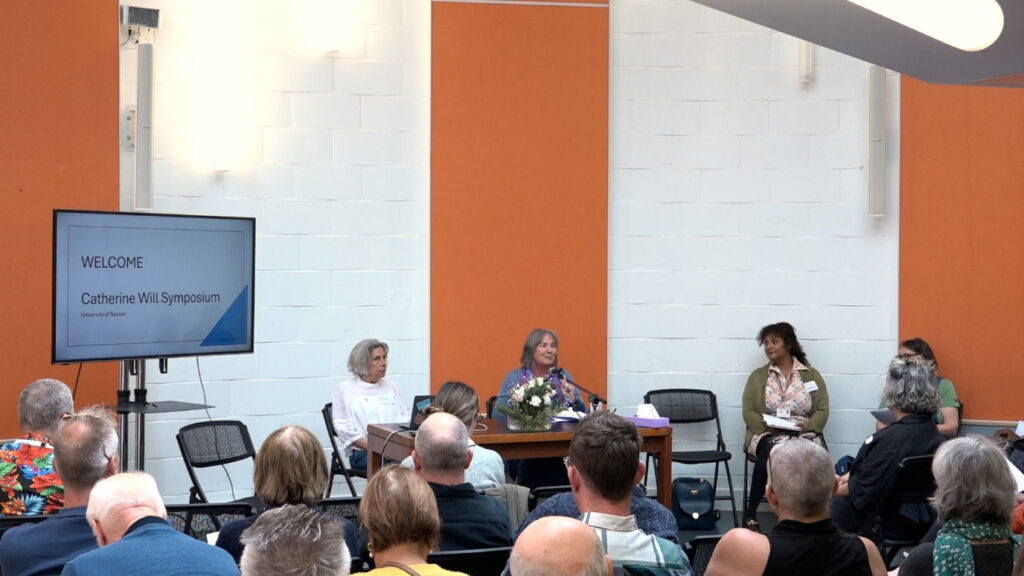
The first panel was chaired by Rachel Thomson and Bobbie Farsides, and brought together some of Catherine’s colleagues, collaborators and PhD students. These included Alison Phipps, Gillian Bendelow, Kate Weiner, Ulla McKnight, Kate Spiegelhalter, Eleanor Kashouris and Shadrack Mwele. We heard about the relationships panellists shared with Catherine. Each one was unique, but some common motifs became apparent as the session went on:
Catherine’s generosity: introducing PhD students to her network, nominating colleagues for roles with journals and societies, taking the lead as first author and principal applicant on collaborative work, and placing others as first authors where she knew it would help their careers.
Catherine’s fierce intelligence: her ability to think broadly across literatures, thinking with colleagues and with theory, sharing her excitement over reading, concepts. This translated across her teaching and administration, but also into parenting and friendship. Her intelligence could be both humbling and exciting, and was accompanied by a wicked sense of humour whose warmth allowed her to tease without alienating.
Catherine’s straight talking and writing: we heard how collaborators who first met Catherine through her written works were inspired by her lucid prose, ability to make complex ideas accessible, and coin phrases and ideas that travelled.
A sense of loss and appreciation: recognition of the enormity of the loss associated with her diagnosis and illness. Regret at having to cut short collaborations and relationships – some of which had only just begun, while others had been developed over many years. Recognition that her commitment to keep working through the illness exacted a toll from colleagues who helped her do so.
Although Catherine’s life was cut short, the panel made clear that her intellectual journey was rich, significant and far reaching.
Paper Presentations
Once the opening panel had concluded, Paper Session 1, chaired by Flis Henwood, explored the theme of ‘Medical devices, health technologies and health regimes’.
Henriette Langstrup (University of Copenhagen) spoke on ‘Digital health citizenship – a spectrum of participation in healthcare’. Acknowledging Catherine’s work in the field of digital health, she described the collective understanding of citizenship that emerged from her own empirical work on everyday chronic care management. Henriette defined digital health citizenship as a spectrum of digital participation in health care, comprising a wide and ambivalent set of relations between citizens, technologies and healthcare systems. This spectrum is not limited to the invited, individual uptake of prescribed digital tools, but also the uninvited, collective and activist mobilizations which challenge and reimagine how digital technologies can contribute to care.
Dorthe Kristensen (University of Southern Denmark) spoke next, presenting a paper titled ‘Tracking towards care: Relational affordances of self-tracking in gym culture.’ Dorthe reflected on how Catherine’s work on self-tracking had influenced her own thinking. Drawing on an ethnography of self-tracking conducted in a fitness centre, she explored how assemblages of actors and objects (specifically digital/analog tracking devices and data) come together to ‘afford’ care.
Linsey McGoey (University of Essex) revisited Catherine’s 2007 paper ‘The Alchemy of Clinical Trials,’ arguing that this work paved the way for new connections between realms that were disconnected for too long. Catherine’s article explored the social construction of ‘objective’ clinical trials. Using deliberately provocative language, Catherine made prescient connections between scientific research, alchemy, magic and mystification. Linsey traced new resonances between Catherine’s work and the concept of ‘oracular power,’ defined as any entity upheld as the highest authority on the boundaries between the known and the unknown. From there, Linsey argued that what she terms ‘cruel statistics’ – such as GDP and GDP per capita – are integral to any twenty-first century theory of power and inequality.
Kate O’Riordan (Sussex University) presented a paper entitled ‘Attention, relation and trace’ that engaged with Catherine and colleagues’ Tracking Ourselves project . Kate revisited two publications from the project: ‘Negotiating the practical ethics of ‘self-tracking’ (published in Social Science and Medicine) and ‘Everyday Curation?’ (published in Big Data and Society), placing particular emphasis on the language of attention and attending, relationality and the reciprocal. She connected these to different ways of thinking about ‘trace’ in her own work, understood as a lived tension between tracking and connection analogous to that between surveillance and care in the work of Catherine and her colleagues.
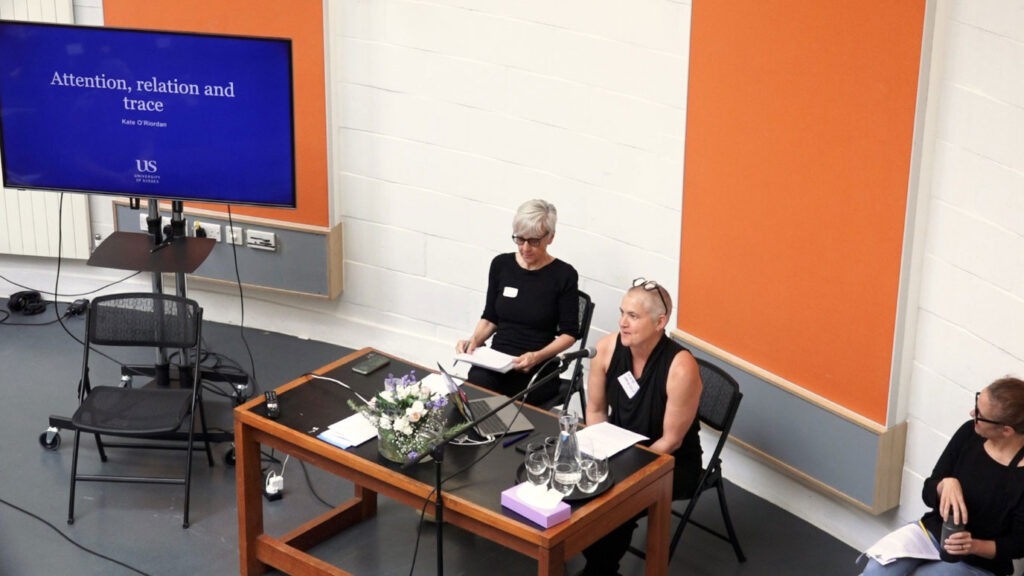
The final presentation of session saw Cécile Chevalier and S. L. Nelson (University of Sussex) examine ‘Bodies in Flux: Human Augmentation, Biopolitics, and the Ethics of Self-Optimisation’. The presentation built on Catherine’s legacy in digital health infrastructures and equity, exploring human augmentation technologies and their relations to ‘non-conforming’ bodies and identities (in this case, neurodivergent and/or trans people). Critiquing biopolitical and neoliberal notions of ‘self-optimisation’ , Chevalier and Nelson examined these technologies (e.g. prosthetics, smart drugs) as instruments of governance and tools of self-determination. While dominant healthcare and bioethics models place these ‘assistive’ technologies within imagined and restrictive normative narratives of human capacity, the presentation offered an alternative framework, positioning ‘non-conformity’ as a lived and evolving practice that highlights how agency and authorship mediate between ‘non-conforming’ individuals and human augmentation technologies.
Paper Session 2, chaired by Mark Erickson, focussed on Anti-microbial Resistance (AMR) and Microbiology. Catherine’s most recent work came from her Wellcome-funded Marginalization and the Microbe project: an investigation of the social factors and structures that drive AMR. Underpinning this was an investigation of how AMR knowledge and innovation is expressed in microbiology texts and laboratories. Four excellent papers reflected the range and depth of this topic.
First, the Centre for the Social Studies of Microbes (CSSM) Collective (Helsinki University) presented ‘Where microbial collaborations meet: on infections and the environment, care and justice’. Drawing on field work conducted in a range of locations, the paper framed AMR as much more than a ‘human wicked’ problem. Traditional approaches to the subject may therefore be insufficient, especially when compared with queer readings of AMR data from a more-than-human perspective. The paper closed by emphasising Catherine’s attention to just and careful solutions.
David Armstrong, of King’s College London (KCL), then presented ‘An unfinished conversation’. This paper reflected on work David had done with Catherine, and where continuing engagement with Catherine’s work could lead in the future. David presented a strong case for revising our understanding of AMR away from the ‘standard’ model and towards a fuller consideration of AMR, the body, and the human (micro)biome. A strict perspective on AMR compels us to kill all bacteria, but this can be have long-term damaging effects on the body as an ecosystem. David suggested that we need to think of the ecological microbiome model and, perhaps, consider if we are really human, given the huge amount of ‘non-human’ DNA residing inside us.
Sarah Nettleton, who was representing colleague Nik Brown, both from the University of York, then presented ‘Beyond behaviour? And breathe… Some reflections on sociological contributions to understanding responses to AMR’. Combining Catherine’s work on AMR linking the personal to the political with Latourian inspired STS, the paper reflected on Catherine and Sarah’s Editorial for SHI on breath and breathing. Written during the covid-19 pandemic, and drawing on Sarah’s research on cystic fibrosis, the editorial foregrounded everyday and prosaic practices like coughing, breathing, and being,. Catherine’s work thus showed us that people are generally clear and considerate concerning health matters, contra the approach taken by those health institutions who assume that lay attitudes to health are fundamentally emotional, irrational, and ignorant.
To close the session, Jessica Omija Korpela (University of Helsinki) presented their paper on ‘Socioeconomic differences in antibiotic prescriptions: a population based study in Finland’. Jessica’s research investigates the social factors that drive antibiotic prescribing. Drawing on a massive Finnish database of health statistics, Jessica’s paper explored how education, employment status and income predict antibiotic prescribing rates. Like Catherine’s work on marginalization and healthcare, Jessica’s detailed analyses allow for nuanced understandings of where antibiotic need is greatest, and why.
Paper Session 3, chaired by Karen Lowton, centred Catherine’s contributions to the fields of Health, Society, STS and Sociology. The session reflected the breadth, depth, and creativity of Catherine’s contributions to these academic fields, and the vibrancy she added to our conversations about these issues.
The first paper, ‘Whatever Happened to EBM’ by Tiago Moreira, revisited some of the questions posed by Catherine and Tiago’s edited collection on clinical trials (Will and Moreira, 2010/2016). Tiago explored the transformation of Evidence Based Medicine prompted by data-driven health care, algorithmic medicine and AI. The paper focused on the emergence of the boundary space of ‘real-world evidence’, and the mediating role of Patient Reported Outcomes in creating fragile compromises between effectiveness, personalisation and involvement.
In the second paper, ‘Interdisciplinarity, Infrastructures, Inequity’, Ros Williams reflected on her experiences of working with Catherine on Kate Weiner’s Leverhulme-funded Tracking Ourselves? project. Ros told how, as they were establishing themselves as an early career researcher, Catherine came to embody the idea of interdisciplinarity in Ros’s mind, helping Ros take infrastructural theory seriously. Stressing the centrality of inequity to infrastructural design, maintenance and use, Ros ended their talk by discussing how they have enacted the lessons they learned from Catherine in, and then beyond, their first independent post-doctoral project.
The third paper, by Helen Eborall, ‘Preventative Medicine as a Risk to Ordinariness Revisited’, focused on Catherine and Helen’s co-written paper ‘Prevention is better than cure, but… Preventive medicine as a risk to ordinariness.’ Helen recounted how this joint endeavour started seven years prior to its publication in 2011, when the pair had discussed their respective doctoral research on stakeholder views of heart disease prophylaxis (Catherine focusing on statins, Helen on aspirin). Helen explained how the final paper deviated significantly from the starting point, and remains her favourite co-written paper.
Next, Ewen Speed spoke provided ‘Reflections on the Cost of Living Blog’. The blog, set up in 2012, was an experiment in public sociology (even if neither Ewen nor Catherine realised at the time). Catherine was a driving force in the blog’s creation, and a regular contributor of thoughtful and provocative posts.
The fifth paper, ‘Knowledge, Science and Taste in the Age of Protein: Lessons from an obsolete global emergency’ was given by historian Sarah Dry. Sarah asked us to consider ‘who gets to say what makes food good,’, explaining that a newly discovered ‘world protein gap’ united scientists , policy-makers and industrialists in (what they saw as) an urgent fight against a dangerous nutritional deficiency between 1955 and 1974. To meet the needs of a fast-growing global population, these powerful groups believed that food must be reduced to its constituent elements and re-engineered into new protein-rich forms. Often made with waste from industrial processes such as hydrocarbons, these novel proteins were envisioned as solutions to global hunger, pollution and economic stagnation. Few concessions were made to the food and nutrition knowledge of local people, nor their tastes and customs. Sarah drew inspiration from Catherine’s work on medical evidence, exploring several rare cases where scientists did take note of local knowledge. These included Norman Pirie’s work on leaf protein, and research on so-called single cell protein (also known as petroprotein) by MIT nutritionist Nevin Scrimshaw. Sarah showed how not only food, but also knowledge about food, was broken into pieces by those who saw themselves as engineers of a unifying global project.
The closing paper, ‘Laboratory Protocols as Paratactic Poetry’ by Mark Erickson, spoke movingly of Catherine’s final academic work – ‘Scenes From the Many Lives of Escherichia Coli’. Mark framed laboratory protocol as the mainstay of experimental science – an objective and clear account of what one must do to achieve the ‘correct’ results. Mark explored parallels between the poetry of Homer and the construction notion of laboratory protocol, arguing that ancient Greek poetry might yet teach the sociology of science to construct better accounts of science laboratory.
The symposium ended with thoughts and reflections on Catherine’s life and work from Ben Fincham, Head of Sociology and Criminology at the University of Sussex. Ben’s obituary for Catherine, In Memoriam: Catherine Will, co-written with Alison Phipps, is published as part of this same issue.
The symposium was organised by Ben Fincham, Bobby Farsides, Flis Henwood, Jo Moran-Ellis, Karen Lowton, Kate O’Riordan, Mark Erickson and Rachel Thomson. You can view a video recording of the full Symposium at https://hdl.handle.net/10779/uos.29366783.v1.
Author biographies
Mark Erickson is Honorary Visiting Reader in Sociology at the University of Sussex.
Bobbie Farsides is Emeritus Professor at the University of Brighton and Sussex Medical School.
Ben Fincham is Reader in Sociology in the School of Law, Politics and Sociology at the University of Sussex.
Flis Henwood is Emeritus Professor of Social Informatics at the University of Brighton.
Karen Lowton is Professor in Sociology (Ageing and Health) in the School of Law, Politics and Sociology at the University of Sussex.
Jo Moran-Ellis is Professor of Sociology and Head of the School of Law, Politics and Sociology at the University of Sussex.
Kate O’Riordan is Professor of Digital Culture and Pro Vice Chancellor for Education and Students at the University of Sussex.
Rachel Thomson is Professor of Childhood and Youth Studies in the School of Education & Social Work at the University of Sussex.
